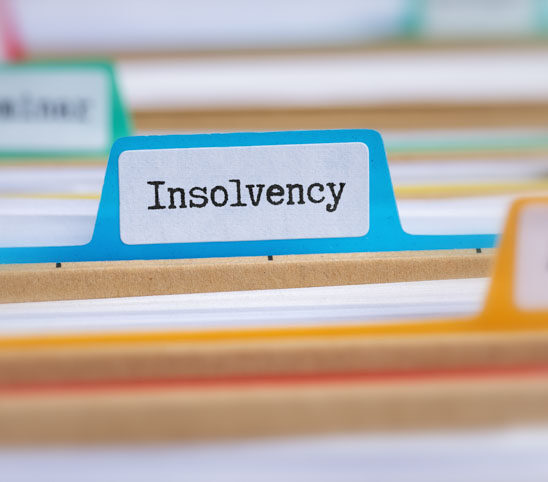HOW TO AVOID INSOLVENCY?
The recent economic turmoil has caused a surge in insolvencies, placing many business owners under mounting financial pressure. Insolvency not only threatens the years of hard work invested in building a business but also endangers innumerable jobs and leads to lost investments.
It is imperative now, more than ever, for business owners to arm themselves with knowledge and strategies to safeguard their ventures. This article seeks to shed light on the early signs of insolvency and offers effective measures about how to avoid insolvency.
by Vanessa Bailey
20.07.2023


What is insolvency?
Insolvency refers to a financial state where a company cannot meet its debt obligations. This condition comes in two main types: cash-flow insolvency and balance-sheet insolvency.
The former occurs when one’s income is insufficient to pay debts on time, while the latter signifies that total debts surpass total assets. Understanding these forms of insolvency provides insight into how they may affect your business operations and financial stability.
Failure to address insolvency promptly may lead businesses down the road of liquidation.
What is insolvency?
Insolvency refers to a financial state where a company cannot meet its debt obligations. This condition comes in two main types: cash-flow insolvency and balance-sheet insolvency.

The former occurs when one’s income is insufficient to pay debts on time, while the latter signifies that total debts surpass total assets. Understanding these forms of insolvency provides insight into how they may affect your business operations and financial stability
Failure to address insolvency promptly may lead businesses down the road of liquidation.
What are the Warning Signs of Insolvency?
To spot insolvency before it becomes a crisis, company directors must be vigilant for warning signs such as recurring cash flow issues, escalating debts, and potential legal actions from creditors.
Cash Flow Issues
Financial distress for a business often begins with cash flow problems. When expenditures surpass revenue, it creates an imbalance demanding attention. It’s crucial to understand where the money is going, and seeking advice from professionals like budget advisors provides invaluable insights. Monitoring market trends can also help businesses anticipate and mitigate risks. A diversified client base spreads the risk, preventing heavy reliance on a single customer or industry.
Increasing Debts
Mounting debts can signal potential insolvency. Enhanced liabilities might arise from various factors, such as unsatisfactory cash flow or excessive credit risks. Regularly checking the solvency ratio offers insights into the company’s debt-handling capability. At times, external expertise from insolvency professionals can direct on actions like asset liquidation if required.
Legal Actions from Creditors
Legal action is a drastic step which creditors might take if a company continually fails to repay its debts. Typically, this process commences with a statutory demand, a formal repayment request. Ignoring such demands can exacerbate financial strain.
Facing business challenges?
Let our expertise guide the way. Your journey to recovery starts here.

Steps to Take to Avoid Insolvency
To steer clear of insolvency, it is essential for company directors to consistently maintain open communication with creditors and proactively negotiate payment plans. Implementing timely financial assessments can also be crucial in detecting and addressing potential issues early. Reviewing the business plan regularly ensures alignment with your financial capabilities, while effective cash flow management aids in meeting monetary obligations promptly.
Seeking advice from insolvency experts can provide invaluable insights into how to avoid insolvency by managing financial strain and ultimately keeping liquidation at bay.
Steps to Take to Avoid Insolvency
To steer clear of insolvency, it is essential for company directors to consistently maintain open communication with creditors and proactively negotiate payment plans. Implementing timely financial assessments can also be crucial in detecting and addressing potential issues early. Reviewing the business plan regularly ensures alignment with your financial capabilities, while effective cash flow management aids in meeting monetary obligations promptly.

Seeking advice from insolvency experts can provide invaluable insights into how to avoid insolvency by managing financial strain and ultimately keeping liquidation at bay.
Communicate with Creditors
Open lines of communication with your creditors can greatly assist in preventing insolvency. Promptly discussing financial difficulties allows both parties to work out feasible payment arrangements and debt restructuring plans.
It’s crucial to be transparent about your company’s current cash flow issues and potential solutions. Nurturing an amicable relationship with creditors often leads to more flexibility during challenging times, such as granting instalment options or Time To Pay (TTP) schemes approved by HM Revenue and Customs.
Regular communication also helps avoid legal actions that could push the business towards insolvency while ensuring you fulfil statutory demands on time.
Negotiate Payment Plans
Engaging in proactive discussions with creditors can become a lifeline for your business. The negotiation of payment plans, commonly known as debt restructuring, gives you the opportunity to propose manageable repayment terms and conditions.
This approach requires honesty about the company’s financial situation and clear communication on what you can actually afford to repay. Creditors tend to appreciate this initiative because they prefer recovering their debts over time rather than facing possible losses if the debtor is liquidated.
Using professional insolvency experts or legal counsel during these negotiations may be beneficial due to their negotiating skills and understanding of finance laws. Be sure not to ignore statutory demands from creditors; instead, address them promptly by proposing feasible instalment options.
Review Business Plan
A thorough review of your business plan is crucial in the fight against insolvency. This process can bring to light areas for improvement that you might have overlooked before, including unrealistic financial projections or unprofitable strategies.
Revising these plans accordingly ensures better alignment with current market trends and reduces the risk of unforeseen liabilities.
Examining your business plan also affords an opportunity to reassess your goals and objectives. Outlining clear goals coupled with their corresponding strategies helps keep track of progress while ensuring improved financial stability for your business.
Ensuring this vital document remains up-to-date gives you a roadmap to success, enhancing adaptability in changing market conditions and empowering informed decision-making processes.
Manage Cash Flow
Keeping track of your cash flow is a key to financial stability. Ensure that you invoice promptly and follow up on late payments to maintain steady cash inflow. Regularly analyse your current cash situation, identifying the source of income and areas of expenditure.
Find ways to reduce overhead costs without compromising the quality or efficiency of your operation. Actively managing these areas can help alleviate any potential financial strain and safeguard against insolvency.
Reduce Overheads
Cutting unnecessary costs is a key measure to avoid insolvency. Businesses must constantly look at their expenses and find areas where they can make savings without hampering operations.
Streamlining processes, outsourcing certain tasks and re-negotiating contracts with suppliers could provide significant cost reductions. These financial buffers increase stability and help to resist financial strain.
It’s about making smart choices that benefit the business in the long-term, leading to improved cash flow and a stronger bottom line.
Seek Expert Advice
Engaging with insolvency professionals should be one of your top priorities to steer clear of financial turmoil. These experts hold a wealth of knowledge, equipped to provide you insightful advice based on their extensive experience in the field.
They can help identify potential trouble spots, offer guidance for effective cash flow management and even assist in negotiating payment arrangements with creditors. Involving them early allows your business to tackle problems head-on before they escalate into insolvency situations.
This approach not only aids in safeguarding your company’s financial health but also contributes towards making informed, strategic decisions that protect your assets and future growth potentials.
Facing business challenges?
Let our expertise guide the way. Your journey to recovery starts here.

How Can Insolvency Professionals Help?
When facing potential insolvency, the expertise of insolvency professionals becomes invaluable. These seasoned experts delve deep into your financial situation, leveraging their knowledge and experience to chart out potential recovery routes, and how to avoid insolvency.
Furthermore, insolvency professionals are adept at providing strategic advice to manage and mitigate risks associated with insolvency. They act as a bridge between businesses and creditors, ensuring that both parties find middle ground while preserving the company’s essence and future prospects.
How Can Insolvency Professionals Help?
When facing potential insolvency, the expertise of insolvency professionals becomes invaluable. These seasoned experts delve deep into your financial situation, leveraging their knowledge and experience to chart out potential recovery routes, and how to avoid insolvency.

Furthermore, insolvency professionals are adept at providing strategic advice to manage and mitigate risks associated with insolvency. They act as a bridge between businesses and creditors, ensuring that both parties find middle ground while preserving the company’s essence and future prospects.
Company Restructure
A company restructure involves making significant changes to the financial, operational, or organisational setup of a business. This is designed to address issues contributing to financial distress, thereby preventing impending insolvency. Restructuring might encompass modifying debt agreements, reducing operational costs, or streamlining the workforce. The aim is to create a more efficient and profitable structure that can adapt and thrive in current market conditions.
Company Voluntary Arrangement (CVA)
A CVA is a formal agreement made between a company and its creditors. It allows the business to repay its debts over time, often at a reduced amount or under different terms than originally agreed upon. The advantage of a CVA is that it provides breathing space to businesses, allowing them to continue operations while making manageable payments to creditors. It is an option that prioritises mutual benefit – businesses avoid bankruptcy, and creditors recover a portion of what they are owed.
HMRC Time To Pay Arrangement
The HMRC Time To Pay Arrangement is a provision that allows businesses experiencing financial hardship to negotiate a longer period to pay their outstanding tax liabilities. This can be instrumental in helping businesses manage cash flow issues. By availing this scheme, companies can avoid immediate financial penalties from HMRC, offering a lifeline during tough economic periods.
Pre-Pack Administration
Pre-Pack Administration is a process wherein the assets of a financially troubled company are sold off before the company enters administration. This method is both time-efficient and maximises asset value. The business is usually sold to a third party, often the company’s directors or existing management. This process preserves jobs, ensures continuity of business, and is generally less disruptive, all while aiming to achieve the best possible outcome for the creditors.
Conclusion
In the face of an increasingly challenging economic landscape, understanding how to avoid insolvency is paramount for business owners. Their proactive and vigilant measures are crucial in safeguarding the years of dedication and hard work they have poured into their ventures.
While the journey towards financial stability might be intricate, several actionable steps can make a definitive difference. Prioritising open communication with creditors, adeptly managing cash flows, and judiciously reducing overheads are key measures in the strategy of avoiding insolvency.
Furthermore, the financial realm, with all its complexities, underscores the immense value of seeking advice from insolvency professionals. Their expertise not only offers a strategic perspective to assess financial challenges but also provides tailored solutions to avert potential pitfalls.
By merging personal initiative with professional guidance, businesses can carve out a resilient trajectory, ensuring continuity, safeguarding jobs, and promoting sustainable growth even amidst economic uncertainties.
Facing business challenges?
Let our expertise guide the way. Your journey to recovery starts here.